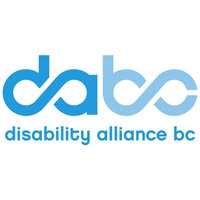The Price of Tax Cuts: Why Reducing Taxes Cost Low-Income Communities More
Recent tax cuts in BC and across Canada were meant to ease financial pressure for Canadians. However, for many low-income individuals, particularly for people with disabilities, these policy changes are having the opposite effect.
Earlier this year, the provincial government removed the BC consumer carbon tax which meant the end of the BC Climate Action Tax Credit (BCCATC). In July, the federal government reduced the lowest personal income tax rate to 14%, further altering the tax landscape. While these actions were intended to offer relief, they end up removing vital financial supports from those who need it the most.
The negative impacts of tax policy changes on marginalized groups are not new; in December, DABC published an article in the Osgoode Hall Law Journal about the “Compounding Barriers to Access” that women with disabilities face within the tax system. The tax system is meant be a tool for redistributing wealth in a way that supports fairness and equity. For people with disabilities, who frequently face barriers to full participation in the workforce, social programs funded through taxes are essential.
Losing the BC Climate Action Tax Credit
When it was in place, the BCCATC was one of these tax measures, offering meaningful support in quarterly payments for people on low-to-modest incomes. A single person making $41,071 or less per year received up to $504. Families making up to $57,288 annually would be eligible for the full credit of $504 for an individual, $252 for their spouse and $126 per child. Now, people who rely on that support are left without alternatives. This hits especially hard for individuals who do not drive and would not benefit from a carbon tax cut.
Lowered Tax Rates Will Reduce Tax Credit Amounts
In July, the federal government lowered the lowest marginal tax rate from 15% to 14% (Bill C-4). While this may sound like good news, it also decreases the value of non-refundable tax credits—such as the Disability Tax Credit, the Canada Caregiver Amount, and the Medical Expense Tax Credit. This reduction means smaller refunds or reduced tax relief for people who rely on these credits to help with essential costs.
For many of our clients, decreased tax amounts are not insignificant— but can go towards urgent health, food, and shelter costs. These new policy changes are unintentionally burdensome for individuals and families who struggle to afford basic needs and are in most need of financial relief.
DABC continues to support actions that call for greater consideration for low-income populations:
- We ask that the provincial government create a new tax credit to replace the financial support lost from the elimination of the BCCATC.
- We call for tax credit amounts to be decoupled from the marginal personal tax rate so that individuals can expect a consistent refund, regardless of tax rate changes.
Accessibility and diversity need to be at the forefront of any policy change. Tax systems should be designed to lift people up—not leave them behind. As governments seek to provide relief and balance their budgets, they must ensure that those already facing the greatest barriers aren’t pushed further into poverty.
The Canada Workers Benefit
November 27, 2023 by DABC
The Canada Workers Benefit (CWB) is a refundable tax credit created by the CRA to help individuals and families that work and earn a low income. The CWB can be claimed each year on your tax return, as long as you are eligible. The CWB has a basic amount and a disability supplement.
What makes someone eligible?
To be eligible for the CWB basic amount, you have to meet the following criteria:
- Earn working income
- Have your net income be below $33,015
- Be a resident of Canada throughout the year
- Be at least 19 years old on December 31st of the eligible tax year, or live with your spouse/common-law partner or your child
It is important to note that you will not be eligible for the CWB if you or your eligible spouse/common-law partner:
- Are enrolled as a full-time student for more than 13 weeks of the year, unless you have an eligible dependent
- Have been confined to a prison for at least 90 days of the year
- Do not have to pay tax in Canada due to a position as an officer or servant of another country
What about the Disability Supplement?
The Disability Supplement has the same eligibility criteria; however, you also have to be approved for the Disability Tax Credit (DTC). The DTC is a non-refundable tax credit that helps reduce taxes owing for people with disabilities and their caregivers, and is also a gateway to federal tax and financial programs. You can learn more about the DTC here.
So, how much can I get?
The maximum basic amount for the CWB is $1,428 for single individuals.
This amount is gradually reduced if your adjusted net income is more than $23,495. Note that your net income is your income after all deductions are made on your tax return. You will not get the basic amount if your adjusted net income is more than $33,015.
For families, the maximum basic amount is $2,461.
Like the amount for single individuals, the amount is gradually reduced if your adjusted family net income is more than $26,805, and you will not receive the basic amount if your adjusted net family income is more than $43,212.
As for the Disability Supplement, the maximum amount is $737 for single individuals and families.
For single individuals, the Disability Supplement is gradually reduced if your adjusted net income is more than $33,018 and you will not receive it if your adjusted net income is more than $37,932.
For families, the Disability Supplement is gradually reduced if your adjusted family net income is more than $43,210. In cases where one spouse is eligible for the Disability Tax Credit, you will not get the Disability Supplement if your adjusted family net income is more than $48,124. If both spouses are eligible for the Disability Tax Credit, you will not get the Disability Supplement if your adjusted family net income is more than $53,037.
It’s important to note that while only one person per household can receive the CWB, if you and your spouse are eligible for the DTC and the Disability Supplement, both of you can receive those amounts.
How will I get my CWB payments?
After claiming the CWB on your tax return, you will get up to 50% of your CWB in the form of advance quarterly payments through what the CRA calls the Advanced Canada Workers Benefit (ACWB). While in previous years you had to apply for advance payments separately, as of 2023, no application is required. Advanced payments will be automatically sent to you.
Another great benefit of the CWB is that the Disability Supplement is retroactive and included in tax calculations when the DTC is applied to your tax returns. This means that if you have been receiving the CWB for a number of years and have recently been approved for the DTC for any years before you applied, you can also receive the Disability Supplement for any year you were deemed DTC eligible while receiving the CWB.
I think I’m eligible but haven’t gotten it! What should I do?
If you think you’re eligible for the CWB and need help filing your taxes, we are here to help. Our Tax AID Program helps people with disabilities with filing their taxes and other tax-related matters. We can help you get up to date on your returns and our advocates can have a one-on-one consultation with you to see if you are eligible and help you secure the CWB.
For more information and to book an appointment, visit our Contact Us page.
*We have created an infographic to accompany this post. Download it here:
https://disabilityalliancebc.org/wp-content/uploads/2025/10/Canada-Workers-Benefit-Infographic.pdf





